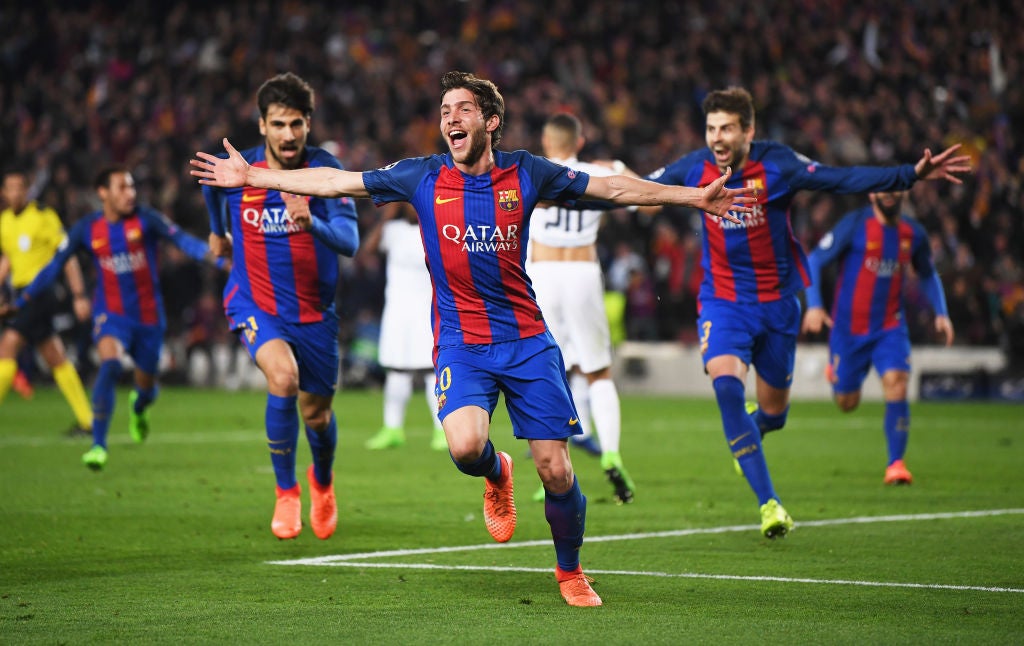The Champions League desperately needs an injection of chaos
In recent years the Champions League has become characterised by a series of historically improbably comebacks - the competition needs some now as the quarter-final second-legs get underway

Your support helps us to tell the story
From reproductive rights to climate change to Big Tech, The Independent is on the ground when the story is developing. Whether it's investigating the financials of Elon Musk's pro-Trump PAC or producing our latest documentary, 'The A Word', which shines a light on the American women fighting for reproductive rights, we know how important it is to parse out the facts from the messaging.
At such a critical moment in US history, we need reporters on the ground. Your donation allows us to keep sending journalists to speak to both sides of the story.
The Independent is trusted by Americans across the entire political spectrum. And unlike many other quality news outlets, we choose not to lock Americans out of our reporting and analysis with paywalls. We believe quality journalism should be available to everyone, paid for by those who can afford it.
Your support makes all the difference.For all their contrasting histories in the Champions League, Frank Lampard and Thomas Tuchel have this week found themselves in similar positions. They have both had to try and make their squads believe they can overcome almost overwhelming situations.
Chelsea are 2-0 down to Real Madrid and Bayern Munich 3-0 down to Manchester City, but the two managers are trying to get their players to overlook these bare facts. Tuchel has been telling his players that, in general play, they were as good as City and it was only individual moments that cost them. The stirring talk is that, consequently, they can just as easily score three.
Lampard has meanwhile been drawing on 2012 again, and how his Chelsea team were also two goals down to Napoli before the most famous comeback in the club’s history.
Roger Schmidt finds himself in a similar situation but from a worse position, given his Benfica team aren’t even at home to try and overcome their 2-0 deficit against Internazionale.
As awesome as these mountainous challenges are in any case, it is asking more than usual of these squads.
That is because it feels like something has shifted with the Champions League as a whole, in the aftermath of the World Cup. It is also highly possible that much of it is a consequence of that Qatar tournament itself. That World Cup certainly represents a potential dividing line in history. So, counterintuitively, does the abolition of the away goal. At least so far.
In the five years before Qatar, the Champions League had become characterised by a series of historically improbably comebacks, sparked by Barcelona’s 6-1 against Paris Saint-Germain. The competition seemed to constantly outdo itself for jaw-dropping drama.
There was some logic to such sensations, though, because players themselves were constantly watching them and realised what was possible. It was a period when a number of records were broken for comebacks, all because such scorelines just didn’t have the same historic significance. Leads of two and three goals could seemingly be blown away by one sudden flurry, totally transforming ties in a way that has never been seen before.

One phrase used at the time was “emotional contagion”. In the same way that a lot of players started trying scorpion kicks in the weeks after Olivier Giroud scored one, teams realised what was possible. On the other side, even one goal could make teams that were in the lead be thinking about the remarkable spectacle they’d witnessed the night before. There was a spirit of chaos throughout the competition.
There has been none of that this season. It has so far been a mostly sedate Champions League, reflected in how three of the quarter-finals already look over. The fatigue of the World Cup no doubt influences this but, either way, such leads have gone from feeling potentially fragile to looking monolithic.
The nature of the teams plays into this. Even if Chelsea get an early goal against Madrid, you only have to look to Anfield for how the European champions navigated that. Madrid look the last team that will be rustled by any sort of response. There was almost an arrogance to how they played around Chelsea at the Bernabeu and it’s hard to see how this will be different. Perhaps Lampard can play on that, and how they can make Madrid pay for not scoring more - but they are equally capable of doing exactly that at Stamford Bridge.
Guardiola’s City have more of a distinctive history of sudden Champions League collapses, but there does seem something different about them this season. The difference of Erling Haaland also plays into that.
Even if Bayern do, say, get two, it’s impossible to see how the openness that would require doesn’t allow the Norwegian so much space and opportunity.

This is what these managers have to work against, of course. They have to inspire a capacity for chaos through focused gameplans.
The only place where it might happen naturally looks like Naples. Milan once again beat Napoli in the first leg, to continue an incredible run against them, but this did not feel another tactical number or a reflection of the game.
Napoli were again fragile but they also created a series of chances. They were the better team. They’ll know that. For the second leg, with their ultras back to make noise after a recent protest, they will be ready to go. Another fast start should be anticipated. Luciano Spalletti at least has an easy job in that sense. This won’t require the same motivation. If they can score, with Victor Osimhen back, it could bring the chaos that has been so lacking in this season’s Champions League.
The other managers have to try and bring it back, by bringing their teams back.






Join our commenting forum
Join thought-provoking conversations, follow other Independent readers and see their replies
Comments